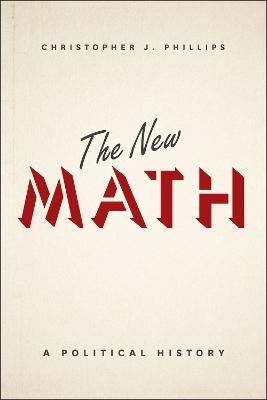
The New Math
A Political History
Seiten
2014
University of Chicago Press (Verlag)
978-0-226-18496-8 (ISBN)
University of Chicago Press (Verlag)
978-0-226-18496-8 (ISBN)
An era of sweeping cultural change in America, the postwar years saw the rise of beatniks and hippies, the birth of feminism, and the release of the first video game. This book examines the rise and fall of the new math as a marker of the period's political and social ferment.
An era of sweeping cultural change in America, the postwar years saw the rise of beatniks and hippies, the birth of feminism, and the release of the first video game. It was also the era of new math. Introduced to US schools in the late 1950s and 1960s, the new math was a curricular answer to Cold War fears of American intellectual inadequacy. In the age of Sputnik and increasingly sophisticated technological systems and machines, math class came to be viewed as a crucial component of the education of intelligent, virtuous citizens who would be able to compete on a global scale. In this history, Christopher J. Phillips examines the rise and fall of the new math as a marker of the period's political and social ferment. Neither the new math curriculum designers nor its diverse legions of supporters concentrated on whether the new math would improve students' calculation ability. Rather, they felt the new math would train children to think in the right way, instilling in students a set of mental habits that might better prepare them to be citizens of modern society - a world of complex challenges, rapid technological change, and unforeseeable futures.
While Phillips grounds his argument in shifting perceptions of intellectual discipline and the underlying nature of mathematical knowledge, he also touches on long-standing debates over the place and relevance of mathematics in liberal education. And in so doing, he explores the essence of what it means to be an intelligent American-by the numbers.
An era of sweeping cultural change in America, the postwar years saw the rise of beatniks and hippies, the birth of feminism, and the release of the first video game. It was also the era of new math. Introduced to US schools in the late 1950s and 1960s, the new math was a curricular answer to Cold War fears of American intellectual inadequacy. In the age of Sputnik and increasingly sophisticated technological systems and machines, math class came to be viewed as a crucial component of the education of intelligent, virtuous citizens who would be able to compete on a global scale. In this history, Christopher J. Phillips examines the rise and fall of the new math as a marker of the period's political and social ferment. Neither the new math curriculum designers nor its diverse legions of supporters concentrated on whether the new math would improve students' calculation ability. Rather, they felt the new math would train children to think in the right way, instilling in students a set of mental habits that might better prepare them to be citizens of modern society - a world of complex challenges, rapid technological change, and unforeseeable futures.
While Phillips grounds his argument in shifting perceptions of intellectual discipline and the underlying nature of mathematical knowledge, he also touches on long-standing debates over the place and relevance of mathematics in liberal education. And in so doing, he explores the essence of what it means to be an intelligent American-by the numbers.
Christopher J. Phillips is assistant professor and faculty fellow in New York University's Gallatin School of Individualized Study.
| Erscheint lt. Verlag | 19.12.2014 |
|---|---|
| Reihe/Serie | Emersion: Emergent Village resources for communities of faith |
| Sprache | englisch |
| Maße | 17 x 24 mm |
| Gewicht | 482 g |
| Themenwelt | Schulbuch / Wörterbuch |
| Geschichte ► Allgemeine Geschichte ► Zeitgeschichte | |
| Geisteswissenschaften ► Geschichte ► Regional- / Ländergeschichte | |
| Geschichte ► Teilgebiete der Geschichte ► Kulturgeschichte | |
| Mathematik / Informatik ► Mathematik ► Geschichte der Mathematik | |
| Sozialwissenschaften ► Pädagogik ► Allgemeines / Lexika | |
| ISBN-10 | 0-226-18496-X / 022618496X |
| ISBN-13 | 978-0-226-18496-8 / 9780226184968 |
| Zustand | Neuware |
| Haben Sie eine Frage zum Produkt? |
Mehr entdecken
aus dem Bereich
aus dem Bereich
Gewalt, Umwelt, Identität, Methode
Buch | Softcover (2024)
Spector Books OHG (Verlag)
36,00 €
der Osten, der Westen, der Zorn und das Glück
Buch | Hardcover (2024)
S. Fischer (Verlag)
26,00 €


